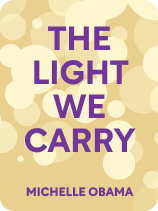

This article is an excerpt from the Shortform book guide to "The Light We Carry" by Michelle Obama. Shortform has the world's best summaries and analyses of books you should be reading.
Like this article? Sign up for a free trial here.
What is Michelle Obama’s The Light We Carry about? What does Obama mean by finding your light?
According to Michelle Obama in her book The Light We Carry, everyone has the potential to bring positive change into the world by nurturing and sharing their unique abilities, strengths, and perspectives. Obama says that these attributes form your “light” and identifies three benefits of finding your light.
Here’s a look at the benefits of finding your light and sharing it with the world.
Benefit #1: Improving Mental Health
One benefit to nurturing and sharing your light with the world is better mental health. To explore why, let’s first consider why not sharing your light harms your mental health. It takes a lot of energy to hide or downplay your true self, Obama says. Constantly analyzing and adjusting your behavior to maintain this facade leads to stress and exhaustion.
(Shortform note: People with autism arguably feel this pressure to downplay their light especially keenly, and their mental health suffers as a result. Autistic burnout is an intense physical, mental, and emotional exhaustion caused by “masking.” Masking involves hiding neurodivergent traits like stimming (repetitive movements that help autistic people regulate emotions) and mimicking neurotypical traits like maintaining eye contact (which autistic people often find uncomfortable or distracting). In other words, they’re pressured to act in ways that contradict their brain’s natural inclinations, often leading to depression and difficulty with daily tasks.)
In contrast, people who share their true selves are happier and have better self-worth, Obama implies. They spend their energy nurturing their light rather than downplaying it, and they feel less stress and shame because they don’t feel the need to hide their identity.
| Living Authentically Strengthens Your Self-Worth Studies show that living authentically leads to greater life satisfaction and well-being, as Obama says. This could be because living authentically strengthens your self-worth, according to Mark Manson (author of The Subtle Art of Not Giving a F*ck)—especially if you share something that you’re typically ashamed of. Sharing something about yourself that you’re ashamed of with others shows vulnerability, which makes people feel connected and encourages empathy and compassion. As such, people are more likely to treat you kindly and lovingly when you’re open with them. This positive treatment reinforces that your worth doesn’t rely on being perfect—there are people who will love you regardless—and this increases your confidence and happiness. |
Benefit #2: Creating Positive Social Change
Nurturing your unique light gives you a sturdier foundation from which to create positive social change. Obama explains that hardship and uncertainty are facts of life, and they often make people feel helpless and prevent them from enacting change. However, you can overcome this sense of helplessness by focusing on your abilities and strengths—elements that contribute to Obama’s definition of light. By focusing on what you can do rather than what you can’t, you’ll feel more confident and able to face uncertain and difficult situations.
(Shortform note: In Grit, Angela Duckworth agrees that hardship and uncertainty cause helplessness. More specifically, she says helplessness occurs when you experience negative events you have no control over. Going forward, because you had no control over these past events, you feel helpless even in unrelated situations that you can influence. Counter helplessness through learned optimism: Reframe situations to see problems as temporary and fixable. When you believe your situation can be improved, you can start applying your abilities and strengths to improving it, as Obama recommends.)
Obama faced uncertainty and hardship when becoming First Lady, which could’ve stopped her from enacting change. Instead, she used the power of her position to start several initiatives focused on social change. (Shortform note: Nurturing and sharing her light helped Obama start these initiatives, but they’re arguably a method for sharing her light as well. In Becoming, Obama says her initiative Let Girls Learn was inspired by how education helped her succeed. Founding this initiative shared that part of her light with the world.)
Benefit #3: Building Community
According to Obama, nurturing and sharing your light helps build communities in two ways:
1. People who nurture their light are more empathetic, and empathy facilitates community-building. When you spend time finding your light, it becomes easier to recognize other people’s light and better understand their perspectives. In turn, this increase in empathy helps you form supportive relationships: It’s easier to see past any differences between you and another person and focus on what you have in common. This increased understanding helps you recognize how the other person can use their skills to support others and identify the areas they need more support with. These supportive relationships are the first step in building a community.
2. When you share your authentic light with the world, you encourage others to do so too, which also builds community. Many people don’t share their light because they’re afraid no one will understand or relate to them. When you share your authentic self despite this fear, you show them they’re not alone and make authenticity less daunting, helping them overcome their fear.
(Shortform note: Sharing your light may help to build community because doing so provides others with validation and connection. When people see that others have had experiences similar to theirs, their experiences and sense of identity are validated—they feel like they’re part of a group rather than an outlier. This improves their self-esteem. In turn, people with higher self-esteem are more likely to share their light with others and keep forging connections and community.)
| Building Community Through Empathy Obama explains that those who nurture and share their light are more empathetic since they can recognize other people’s light more easily. In The 7 Habits of Highly Effective People, Stephen R. Covey adds that nurturing your light can increase empathy by shifting the way you think about yourself, as well as others. People who recognize that their perspective is unique realize their opinions aren’t objectively right and recognize that everyone is influenced by their experiences, which encourages them to empathetically listen to others. This increased communication and understanding helps people form stronger relationships and start building a community. Business experts agree that empathy can likewise help people support each other’s growth and success in the workplace. If you recognize and understand another person’s perspective, you can encourage and direct them in ways that best suit their abilities, strengths, and experiences. This knowledge is an important part of “people management,” a management style that focuses on optimizing and retaining talented workers—in other words, creating a strong work community. |

———End of Preview———
Like what you just read? Read the rest of the world's best book summary and analysis of Michelle Obama's "The Light We Carry" at Shortform.
Here's what you'll find in our full The Light We Carry summary:
- Michelle Obama's advice on fulfilling your potential in life
- The benefits of nurturing and sharing your unique abilities and strengths
- How to overcome the obstacles to reaching your potential and creating change






